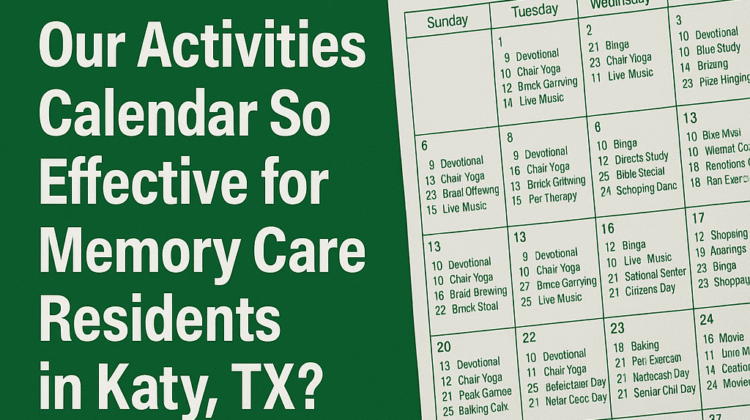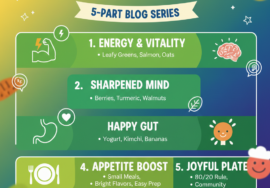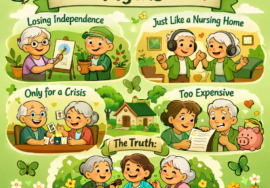
What Makes Our Activities Calendar So Effective for Memory Care Residents in Katy, TX?
Evergreen Cottages’ Signature Approach to Cognitive Engagement and Purposeful Daily Living
Activities calendar for memory care residents in Katy TX
Supporting Keywords: senior living Katy TX, dementia care Katy, daily schedule for Alzheimer’s, assisted living activity planning, memory care community calendar
Introduction
When choosing a memory care community for a loved one, families often focus on amenities, safety, and staff experience. But one of the most overlooked—yet most critical—elements of effective dementia care is the monthly activities calendar. At Evergreen Cottages in Katy, TX, our calendar is not simply a list of events. It is a strategically crafted daily rhythm, developed by dementia care experts to support cognitive function, emotional wellness, and quality of life.
In this five-part series, we’ll explore why Evergreen Cottages’ activities calendar stands out, how it is created, and the impact it has on our memory care residents. Whether you are comparing assisted living options in Katy or simply want to understand what great memory care looks like in practice, this guide will provide a clear, research-backed lens.
Table of Contents
Volume 1: Introduction and Table of Contents
- Why an activities calendar matters in dementia care
- What makes Evergreen Cottages’ approach different
- Overview of upcoming volumes
Volume 2: The Science Behind the Calendar
- How cognitive stimulation slows memory decline
- Occupational therapy insights built into daily planning
- The role of repetition and variety in Alzheimer’s care
Volume 3: How We Build Our Monthly Activities Calendar at Evergreen Cottages
- Planning process from clinical leadership
- Balancing familiarity with new stimulation
- Customizing activities for various dementia stages
Volume 4: A Day in the Life — Walking Through a Real Week at Jasmine Cottage
- Examples from the August 2025 calendar
- How we structure mornings, afternoons, and evenings
- Sensory, spiritual, social, and cognitive balance
Volume 5: Measurable Impact and Family Feedback
- Outcomes we track in resident engagement
- Testimonials from Katy families
- FAQ about activity calendars and memory care
Why the Activities Calendar Matters
In memory care settings, structure is not just helpful—it is essential. Residents with Alzheimer’s or other types of dementia often feel disoriented or anxious when routines are inconsistent. A clear, consistent, and expert-designed activities calendar offers predictable comfort while also introducing gentle stimulation to keep the brain active.
At Evergreen Cottages in Katy, our calendar is designed to do more than fill time. Every line item—whether it’s a devotional, a music session, a group discussion, or a sensory activity—is selected to:
- Spark recognition
- Reinforce skills
- Reduce agitation
- Foster emotional connection
- Maintain or even rebuild cognitive function where possible
Our residents don’t just attend events. They engage in therapeutic daily rhythms that build purpose, safety, and joy.
Evergreen Cottages: A Local Leader in Memory Care Programming
As one of Katy, TX’s most trusted memory care communities, Evergreen Cottages has developed a reputation for evidence-based activity programming. Our activities calendar is reviewed and adjusted monthly by our clinical leadership team, ensuring that it stays relevant to residents’ evolving needs.
Our August calendar, for example, includes a blend of:
- Chair yoga for physical coordination
- Bible study and devotionals for spiritual grounding
- Art therapy sessions to support motor skills and memory recall
- Group games like Bingo to foster social connection
- Sensory activities designed to calm and orient residents with advanced dementia
It’s not random. It’s not recycled. It’s a local, intentional strategy that has helped dozens of Katy families feel confident in their loved ones’ care.
When done right, an activities calendar is not just a schedule. It is a tool for restoring dignity, stimulating cognition, and honoring each resident’s identity—one day at a time.
The Science Behind the Calendar
Why Cognitive Stimulation Matters in Memory Care
Scientific research consistently shows that daily cognitive engagement can slow the progression of dementia, reduce anxiety, and improve quality of life in seniors. At Evergreen Cottages in Katy, our activities calendar is built on this foundation. It is more than a list of events—it is a clinically-informed tool designed to stimulate different areas of the brain throughout the day and across the week.
The human brain thrives on routine with variety—especially in individuals with memory loss. When activities are too repetitive or passive, residents may become disengaged, withdrawn, or even more confused. On the other hand, when activities are thoughtfully designed and personalized, they support:
- Short-term memory reinforcement
- Language processing
- Motor coordination
- Emotional regulation
- Social recognition and bonding
Each section of our calendar directly correlates with one or more of these cognitive benefits.
Built on Occupational Therapy and Neurology Insights
Evergreen Cottages partners with experts in gerontology, occupational therapy, and memory care to infuse clinical best practices into our calendar development. Each activity type maps to a specific therapeutic goal.
Examples from the calendar:
- Art sessions stimulate the prefrontal cortex and fine motor skills
- Trivia and word games engage language centers and working memory
- Chair yoga and movement classes support vestibular balance and spatial awareness
- Devotionals and faith-based discussion activate long-term memory and emotional processing
- Music therapy can evoke memories, reduce agitation, and boost mood through auditory pathways
This isn’t theoretical. It’s local application of national research, delivered daily to residents right here in Katy, TX.
The Role of Repetition with Variety
You’ll notice that many of the events on our August activities calendar recur regularly—Bingo, Bible study, chair yoga, live music, and devotional services appear weekly. This is intentional.
Repetition helps build routine and reduce stress, especially for residents in mid-to-late stages of dementia. But within that structure, we provide enough variation to stimulate different senses and thinking patterns, ensuring that residents stay engaged and don’t experience cognitive stagnation.
For example:
- Our Bingo sessions may introduce themed visuals, music, or sensory components
- Music sessions feature different instruments, genres, or guest performers
- Devotionals may tie into current events, seasonal themes, or resident stories
This balance is what makes our calendar therapeutic and sustainable, even for residents with complex needs.
Emotional and Behavioral Outcomes Tied to Calendar Design
We have observed firsthand how a thoughtfully structured activities calendar improves not just cognition, but also:
- Mood stability
- Sleep patterns
- Appetite and hydration
- Decreased fall risk (through better balance and strength)
- Reduction in sundowning symptoms
These results align with national studies but are especially meaningful for our local families in Katy who want to see their loved ones not just safe—but thriving.
Key Takeaway
At Evergreen Cottages, the science behind our activities calendar is not a bonus. It is the baseline. Every month, every event, every time slot is purpose-built for brain health, memory support, and emotional well-being.
How We Build Our Monthly Activities Calendar at Evergreen Cottages
Our Planning Philosophy: Structure with Heart
The activities calendar at Evergreen Cottages is not built by chance or copied from other communities. It is crafted from the ground up by our clinical team, caregiving staff, and activities coordinators—many of whom have decades of experience supporting memory care residents in Katy, TX.
We begin each month with a single question:
What would bring our residents joy, structure, and stimulation—right now, at this stage of their lives and memory health?
The answer changes month to month, because our residents change. Dementia is not static. Neither is our programming.
Step 1: Monthly Clinical Review of Resident Needs
Before we even begin selecting activities, our care team meets to assess:
- Current cognitive and emotional needs of each resident
- Recent health updates or diagnoses that may impact engagement
- New medications, behavioral patterns, or mobility changes
- Family feedback from recent visits or check-ins
This local, personalized process ensures the activities calendar for our memory care residents in Katy reflects where they truly are—not where they were 3 or 6 months ago.
For example, if we notice increased evening restlessness among certain residents, we may introduce calming tactile activities or music wind-downs during the 4-6 p.m. time block.
Step 2: Layering the Pillars of Engagement
Once we’ve assessed resident needs, we design the calendar around four core engagement areas:
1. Cognitive
Word games, trivia, music, and guided discussions designed to spark memory recall and keep the mind active.
2. Physical
Chair yoga, balloon volleyball, and light exercise to support mobility, balance, and body awareness.
3. Social
Group meals, birthday parties, movie nights, and pet therapy sessions to reduce loneliness and foster community.
4. Spiritual/Emotional
Devotionals, Bible studies, music worship, and reminiscence therapy that offer grounding and peace.
We ensure that every day includes a healthy blend of all four areas—because no senior is one-dimensional, and neither is our care.
Step 3: Balancing Routine and Novelty
We’ve already talked about how critical repetition is for memory care residents—but variety also matters. That’s why we follow a core weekly rhythm (e.g., Devotionals every Monday, Bingo every Thursday), while rotating in fresh themes like:
- Seasonal art projects
- Guest musicians or entertainers
- Holiday-themed celebrations (e.g., National Senior Citizens Day in August)
- Cooking demonstrations or food tastings
- Themed storytelling sessions or resident spotlights
This intentional mix ensures the calendar feels familiar yet exciting—an essential balance for seniors with Alzheimer’s or other dementias.
Step 4: Localizing to Life in Katy, TX
Evergreen Cottages is deeply rooted in Katy. Our activities calendar regularly features:
- Faith-based programs tied to local churches
- Food and music from the Texas Gulf Coast region
- Celebrations of Katy-based holidays and community events
- Partnerships with nearby schools, hospice organizations, and volunteers
This local connection makes the experience more meaningful for our residents, many of whom have spent decades in the Katy or greater Houston area.
Step 5: Flexibility Built Into Every Day
While the calendar provides structure, we remain flexible based on resident mood, health, and real-time engagement. If a group becomes overstimulated by a planned activity, our caregivers can pivot. If a resident is having a tough day, they can be gently offered a quieter alternative like 1:1 reminiscing or aromatherapy.
That’s the Evergreen Cottages difference.
The activities calendar isn’t just posted on the wall. It’s lived and adapted with care.
A Day in the Life — Walking Through a Real Week at Jasmine Cottage
Focus Keyword: activities calendar for memory care residents in Katy TX
Supporting Keywords: Jasmine Cottage Katy TX, memory care daily schedule, dementia care routine, senior engagement Katy, assisted living activities example
Turning a Calendar Into Daily Life
At Evergreen Cottages’ Jasmine Cottage in Katy, TX, our activities calendar is not a suggestion—it’s a rhythm. It brings structure to each resident’s day while honoring the need for flexibility, emotional care, and human connection. In this volume, we’ll walk through a realistic week of engagement drawn directly from the August 2025 activities calendar to show how memory care is delivered in practice.
Each activity has a purpose. Each time slot has intention. And every resident is guided with kindness and clinical insight.
Morning Routine: Comfort and Orientation
Our days begin with calm, consistency, and familiar rituals.
Sample Morning Schedule (Monday):
- 8:00 a.m. – Gentle wake-up, hygiene support, and breakfast
- 9:30 a.m. – Morning devotional and prayer
- 10:30 a.m. – Chair yoga and light stretching
- 11:15 a.m. – Hydration break with music playing softly
- 11:45 a.m. – Social lunch with staff and residents
Purpose:
Mornings are designed to reduce confusion and disorientation. The combination of spiritual connection, movement, and social eating grounds our residents in the day’s rhythm. This consistent start improves alertness and helps ease the transition from night to day, which is especially important for residents with Alzheimer’s or sundowning symptoms.
Afternoon Engagement: Cognitive and Social Activation
Afternoons are when the brain is most active for many residents, so we program our most stimulating activities during this window.
Sample Afternoon Schedule (Wednesday):
- 1:00 p.m. – Watercolor art session (theme: sunflowers)
- 2:00 p.m. – Word games and trivia
- 3:00 p.m. – Snack time with smoothies or fresh fruit
- 3:30 p.m. – Small group discussion: “Memories of Summer”
- 4:15 p.m. – Calming instrumental music or independent leisure time
Purpose:
These sessions are designed to stimulate short-term memory, conversation skills, and motor coordination, while also building a sense of joy and community. The afternoon lineup often changes based on the season, current events, or resident feedback—but it always maintains the balance of creativity, conversation, and calm.
Evening Routine: Wind-Down and Comfort
Evenings are focused on comfort, familiarity, and reducing overstimulation.
Sample Evening Schedule (Friday):
- 5:00 p.m. – Dinner with soft lighting and relaxing music
- 6:00 p.m. – Movie night: Classic musical or nature documentary
- 7:30 p.m. – Bedtime prep and individual check-ins
- 8:00 p.m. – Optional aromatherapy or soft reading time
- 8:30 p.m. – Lights dimmed, transitions to rest
Purpose:
Evening activities on the calendar are designed with intention. The goal is to create a safe and peaceful environment that reduces sundowning symptoms, supports restful sleep, and helps residents feel emotionally grounded.
Weekly Highlights from the August 2025 Activities Calendar at Jasmine Cottage
Here are just a few themed events that brought residents joy during the first two weeks of August:
- National Ice Cream Sandwich Day: Residents created their own ice cream treats with assistance
- Live Gospel Performance: A local group performed familiar hymns, sparking memory and participation
- Bible Study Series: Exploring Psalms with discussion led by Next Level Hospice
- Creative Corner: Residents painted canvas boards with stencils, helping support fine motor skills
- Shopping Day: In-house boutique shopping set up for residents to browse familiar items
These events aren’t random. They’re expertly placed into the calendar to enhance memory, independence, and joy, all while keeping routines predictable for residents with cognitive conditions.
Balancing Care and Customization
While the activities calendar provides structure, it is never rigid. At Jasmine Cottage, if a resident prefers gardening over painting, we adapt. If someone is having a high-anxiety day, they may be gently offered a quieter corner activity instead of a group session.
That flexibility—combined with consistency—is exactly what makes Evergreen Cottages’ approach so powerful. It’s a tailored experience that works for real people, not just a schedule on paper.
Measurable Impact and Family Feedback
Focus Keyword: activities calendar for memory care residents in Katy TX
Supporting Keywords: senior care Katy TX reviews, family feedback memory care, Alzheimer’s daily schedule benefits, dementia activities results, Evergreen Cottages success stories
When You Can See the Difference Daily
At Evergreen Cottages in Katy, TX, our memory care activities calendar is not just something we post on the wall. It’s something families see working—in their loved one’s demeanor, behavior, sleep quality, emotional stability, and social connection.
We track engagement, observe behavioral changes, and listen closely to what families tell us. And the results consistently point to one thing:
A thoughtfully designed, personalized activities calendar has measurable outcomes for memory care residents.
Outcomes We Track
Our caregiving and activities staff note:
- Activity participation rates (daily and weekly)
- Mood changes before and after structured sessions
- Changes in appetite, sleep patterns, and hydration
- Reduction in agitation or wandering behavior
- Positive social interaction frequency
- Overall alertness and cognitive responsiveness during the day
We’re not aiming for perfection. We’re aiming for progress—and comfort—in the context of memory loss.
Resident Success in Real Terms
A daughter of one resident shared this after three weeks at Jasmine Cottage:
“Mom used to just sit in her chair most of the day. Now, when I call, she’s either just finished a painting activity or is about to go to Bible study. She’s calmer, more herself, and she even smiles when I ask about her day.”
Another local Katy family told us:
“We toured a few communities before Evergreen. What stood out here wasn’t just the cleanliness or staff friendliness—it was the activities calendar. Every day felt purposeful, not just busy. That mattered to us.”
These aren’t just compliments. They’re validation that our approach is working for the seniors and families we serve in Katy and greater Fort Bend County.
Why Families Are Drawn to Evergreen’s Calendar Approach
When families are choosing between memory care communities in Katy, TX, they often ask:
- Will my loved one be bored or just left alone?
- Is there a sense of normalcy and structure?
- Are activities meaningful—or just there to check a box?
Evergreen Cottages has built a reputation around answering those concerns with action. Our activities calendar exists to do the following:
- Provide daily structure for memory stabilization
- Reinforce lifelong identity through tailored events
- Support the body, mind, and spirit with clinical and emotional care
- Create joy—even on difficult days
Final Takeaway
The effectiveness of our activities calendar for memory care residents in Katy TX lies in its intention, structure, and daily delivery. Behind every devotional, art session, or music hour is a strategy designed to restore dignity, reduce confusion, and reconnect our residents with what still matters most.
Evergreen Cottages does not offer passive care. We offer purposeful engagement, and our calendar is the heartbeat of that mission.
FAQ: Activities Calendars in Memory Care
What is an activities calendar in memory care?
It’s a structured daily and monthly schedule of therapeutic activities designed specifically for seniors with dementia or Alzheimer’s. These calendars support cognitive, emotional, physical, and social engagement.
How does the activities calendar at Evergreen Cottages differ from other communities?
Ours is personalized, clinically informed, and locally rooted. We build it from scratch each month based on resident needs and feedback—not from a template.
Are the activities really dementia-friendly?
Yes. Each activity is designed with stages of memory loss in mind. We use visual cues, sensory support, repetition, and adapted pacing to meet each resident where they are.
Can families see the calendar before move-in?
Absolutely. We encourage families to review our current activities calendar and even visit during an activity session to see it in action.
How do you adapt the calendar if a resident has unique needs or preferences?
We build flexibility into each day. If a resident prefers one-on-one activities, has limited mobility, or specific triggers, we adjust the experience while keeping them included.
Do these activities actually improve memory?
While no activity can reverse dementia, consistent cognitive stimulation has been shown to slow progression, improve mood, reduce anxiety, and enhance quality of life.
How often do you update the calendar?
Monthly. Every month is built fresh by our care team based on current resident needs and seasonal events.
Are activities optional?
Yes. No one is forced to participate, but our team is trained to encourage and invite gently and respectfully.
What kind of staff leads these activities?
Our activities team includes staff trained in dementia care, alongside clinical leadership who inform the structure and pacing of each program.
Why is the activities calendar important for families to review?
Because it gives insight into the daily life, structure, and quality of care. A strong calendar reflects a community that understands dementia and cares deeply about how residents live each day.



